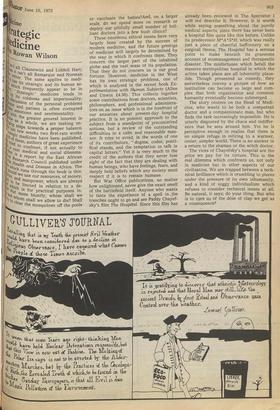ein e
rategic
edbieine
"wan Wilson
all Clausewitz and Liddell Hart; 't isn't all Remarque and Norman either. The same applies to medihas its strategic and its human asWhich frequently appear to be in 'Strategic ' medicine tends to (I? its coldness and impersonality, 6isetission of the personal problems Cr' and patient is often corrupted ; ernotions and sentimentality. 1111 the greater general interest in as a whole, we are making enPs towards a proper balance. litat!St few weeks two first-rate works %`fsic medicine have been published. trit4tlieru, authors of great experience to confront, if not actually to vast 111.4 . medical and social dilemma. is a report by the East African title ';search Council published under 1,,p.ea/th and Disease in Africa. The shownich hi runs through the book is this: itiess'cl We use our resources, of money, manpower, which are always ue limited in relation to a de ' Which ' ? is for practical purposes inNI More bluntly, whom shall we e3r tr,W,horn shall we allow to die? Shall clear the mosquitoes off the pools or vaccinate the babies?And, on a larger scale, do we spend more on research or deploy our pitifully small number of brilliant doctors into a few bush clinics?
These enormous ethical issues have very largely been created by the success of modern medicine, and the future prestige of medicine will largely be determined by the way in which it confronts them. They concern the larger part of the inhabited globe and the vast mass of its population. That they do not concern us is our good fortune. However, medicine in the West has its own strategic problems, one of which is analysed in the recent book Experimentation with Human Subjects (Allen and Unwin £4.50). This collects together some contributions from doctors, scientists, philosophers, and professional administrators on an issue which is in the forefront of our anxieties about present-day hospital practice. It is no polemic approach to the subject from a standpoint of preconceived notions, but a review of the outstanding difficulties in a calm and reasonable manner. It tries to avoid, in the words of one of its contributors, "dogma, codes, pontifical stands, and the temptation to talk in capital letters." Yet it is very much to the credit of the authors that they never lose sight of the fact that they are dealing with human beings, who have feelings, fears, and deeply held beliefs which any society must respect if it is to remain humane. But War Office publications, no matter how enlightened, never give the exact smell of the battlefield itself. Anyone who wants to taste the experience of a spell in he trenches ought to go and see Paddy Chayefsky's film The Hospital. Since this film has already been reviewed in The Spectator I will not describe it. However, it is worth while saying something about the purely medical aspects, since there has never been a hospital film quite like this before. Unlike its predecessor M*A*S*H, which was really just a piece of cheerful buffoonery on a surgical theme, The Hospital has a serious point to make beneath its gruesome account of mismanagement and therapeutic disaster. The misfortunes which befall the massive metropolitan hospital in which the action takes place are all inherently plausible. Though presented as comedy, they nevertheless convey a picture of how an institution can become so large and complex that both organisation and common humanity eventually become submerged.
The story centres on the Head of Medicine, who wants to be both a competent doctor and a compassionate man, but who finds the task increasingly impossible. He is utterly disgusted by the chaos and indifference that he sees around him. Yet he is perceptive enough to realise that there is no simple refuge in retiring to a warmer, cosier, simpler world. There is no answer in a return to the shaman or the witch doctor.
The vices of Chayefsky's hospital are the price we pay for its virtues. This is the real dilemma which confronts us, not only in medicine but in other aspects of our civilisation. We are trapped between a technical brilliance which is crumbling to pieces under the pressure of its own inhumanity, and a kind of soggy individualism which refuses to consider technical issues at all. Be natural, it says; do your thing. But who is to cure us of the dose of clap we get as a consequence?








































 Previous page
Previous page